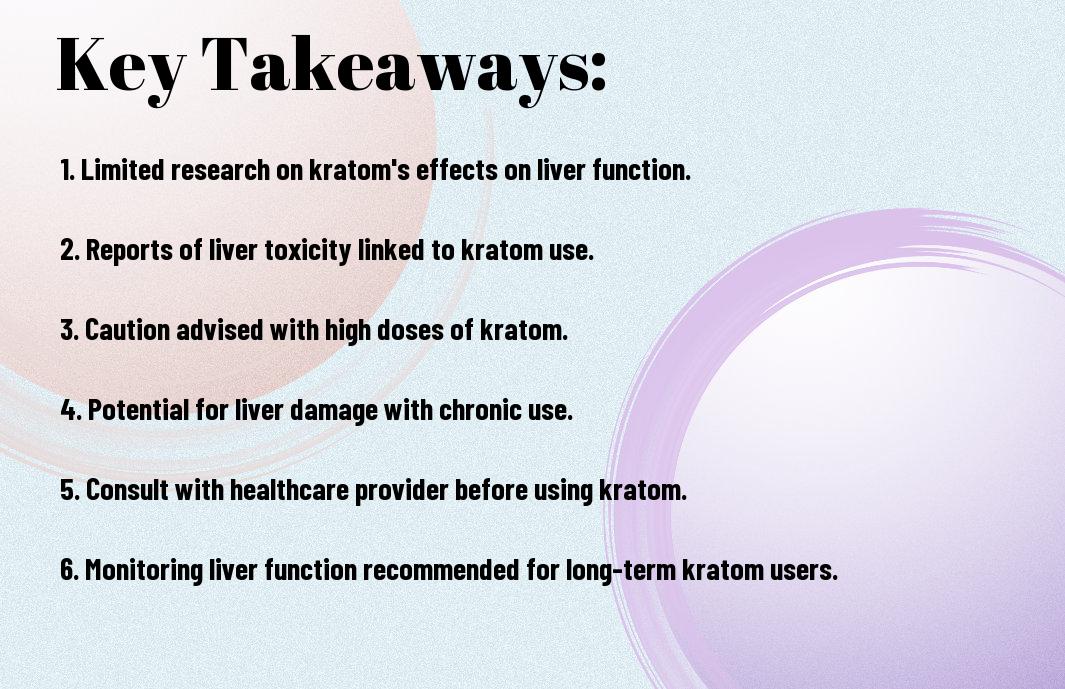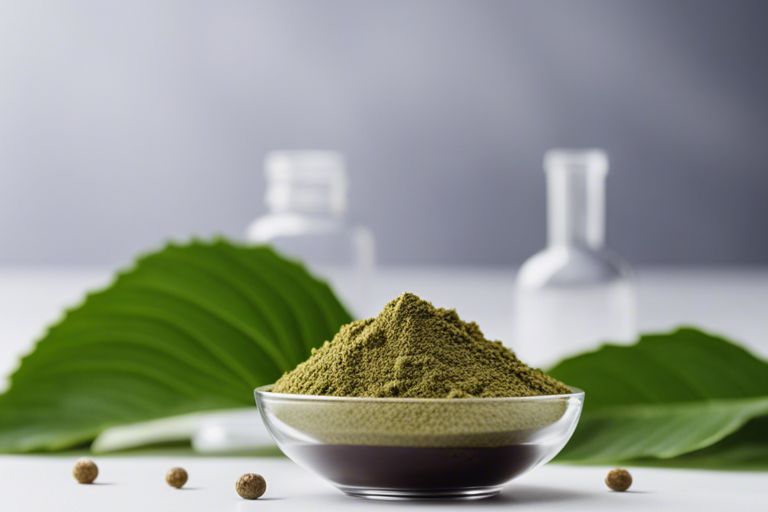Your liver, a vital organ responsible for detoxifying your body, can be impacted by kratom. As you explore the potential effects of kratom on your liver, it’s crucial to be aware of the dangers and risk factors associated with kratom liver toxicity. To learn more about the potential risks and how to safeguard your liver health while using kratom, check out this informative article on Dangers and Risk Factors of Kratom Liver Toxicity.

Kratom Basics
What is Kratom?
The use of Kratom, a tropical evergreen tree native to Southeast Asia, has gained popularity for its potential therapeutic effects. Kratom leaves contain active compounds called alkaloids, with mitragynine and 7-hydroxymitragynine being the most prominent. These alkaloids interact with opioid receptors in the brain to produce stimulant and sedative effects, depending on the dosage and strain of Kratom used.
History and Traditional Use
Traditional use of Kratom dates back centuries in Southeast Asia, where it was consumed by laborers for its energy-boosting properties. In Thailand, it was used as an herbal medicine to manage various ailments and to alleviate fatigue. Kratom was also commonly used in social settings and religious ceremonies.
What started as a practice deeply rooted in Southeast Asian culture has now expanded globally, with Kratom being used for various purposes including pain management, mood enhancement, and opioid withdrawal symptoms relief.
Liver Function and Health
The Role of the Liver in the Body
There’s no doubt that the liver is a vital organ in your body. One of its key functions is to filter and metabolize substances that you ingest, including medications, toxins, and nutrients. The liver helps in breaking down these substances so they can be easily processed and removed from your body.
Common Liver Problems and Diseases
Body, it’s crucial to be aware of common liver problems and diseases that can affect your health. One common liver condition is fatty liver disease, which occurs when there is an accumulation of fat in the liver cells. This can lead to inflammation and may progress to more severe conditions if not addressed in time.
Apart from fatty liver disease, you should also watch out for liver infections like hepatitis, which can be caused by viruses (hepatitis A, B, C) or other factors like excessive alcohol consumption. These infections can lead to inflammation and damage to the liver if left untreated, potentially resulting in long-term consequences for your health.
The Interaction Between Kratom and the Liver
How Kratom Affects Liver Enzymes
Interaction: To understand how kratom affects liver enzymes, it’s important to recognize that the liver plays a crucial role in metabolizing substances like kratom. Kratom contains active compounds that are broken down by liver enzymes, specifically the cytochrome P450 system. When kratom is metabolized by these enzymes, it can lead to the formation of new compounds that may have different effects on the body.
The Impact of Kratom on Liver Function
Function: The impact of kratom on liver function is a topic of ongoing research and debate. While some studies suggest that kratom can cause liver damage in certain individuals, the exact mechanisms are not fully understood. It’s important to be aware of the potential risks and monitor your liver function if you regularly consume kratom.
Affects: The liver is a vital organ responsible for detoxifying the body and metabolizing substances like kratom. If you are considering using kratom, it’s crucial to be mindful of how it may impact your liver function and consult with a healthcare provider if you have any concerns about its effects on your liver.

Potential Risks and Side Effects
Liver Damage and Toxicity
To address concerns about kratom’s potential impact on the liver, it’s crucial to understand that despite the growing popularity of kratom, it has been associated with cases of liver damage and toxicity. Some users have reported experiencing elevated liver enzymes, jaundice, and even more severe conditions such as acute liver failure.
Increased Risk of Liver Disease
Increased risk of liver disease is a significant concern for individuals using kratom, especially those with pre-existing liver conditions or who consume kratom in large quantities over extended periods. Using kratom in combination with other substances or medications that also stress the liver can further increase the risk of developing liver-related issues.
With the limited regulation and oversight of kratom products, it’s crucial to be mindful of potential risks and side effects, particularly concerning liver health. If you experience any unusual symptoms or changes in liver function while using kratom, it’s important to consult with a healthcare provider promptly.
Factors Influencing Kratom’s Effects on the Liver
Your body’s response to kratom can be influenced by various factors, including dosage and frequency of use, as well as individual variations in metabolism and health. It’s important to understand how these factors can impact the effects of kratom on your liver health.
Dosage and Frequency of Use
One factor that can greatly influence the impact of kratom on your liver is the dosage and frequency of use. Higher doses and more frequent use of kratom may put additional stress on your liver as it works to metabolize the compounds in the plant. It’s necessary to be mindful of your kratom consumption and stick to recommended dosages to minimize potential liver issues.
Knowing the appropriate dosage for your body and avoiding excessive use can help reduce the risk of liver damage associated with kratom consumption.
Individual Variations in Metabolism and Health
One aspect that plays a significant role in how kratom affects your liver is your individual metabolism and overall health. Factors such as genetics, liver function, and any pre-existing liver conditions can impact how efficiently your liver processes and eliminates kratom compounds.
The way your body metabolizes kratom can vary from person to person, affecting how the plant interacts with your liver and potentially leading to different outcomes in terms of liver health. It’s crucial to be aware of your own health status and consult with a healthcare professional if you have any concerns about using kratom.
Research and Studies on Kratom’s Hepatotoxicity
Animal Studies and Laboratory Results
Not much is known about the exact mechanisms through which kratom may affect the liver, but animal studies and laboratory experiments have provided some insight. These studies have shown that high doses of kratom extract can lead to liver damage in rodents, including elevated liver enzymes and histopathological changes.
Human Trials and Clinical Observations
The impact of kratom on human liver function is still a topic of ongoing research. The limited clinical data available suggest that while some individuals have experienced liver injury potentially related to kratom use, the exact relationship and causality are not fully understood.
The potential for adverse effects on the liver from kratom use remains a concern, and individuals should be cautious and consult with healthcare professionals if they choose to use kratom, especially in large amounts or over extended periods.
Understanding the potential hepatotoxicity of kratom is crucial in guiding safe use and further research to elucidate the mechanisms involved in liver injury associated with kratom consumption.
Conclusion
Hence, it is crucial to be aware of the potential effects kratom can have on your liver. Understanding how this natural substance may impact your liver function is key to making informed decisions about its use. Remember to consult with your healthcare provider if you have any concerns about how kratom may affect your liver health.
By staying informed and proactive, you can prioritize your liver health while considering the potential benefits and risks of using kratom. Your well-being is paramount, so take the necessary steps to protect your liver and overall health as you navigate the world of natural remedies like kratom.
Q: What is kratom?
A: Kratom is a tropical plant native to Southeast Asia that is commonly used for its stimulant and opioid-like effects.
Q: Can kratom affect the liver?
A: Yes, kratom has been associated with cases of liver injury, although it is rare. Some individuals may be at a higher risk for liver problems due to factors such as pre-existing liver conditions or excessive kratom use.
Q: How does kratom affect the liver?
A: The exact mechanisms by which kratom may cause liver injury are not fully understood. It is thought that certain compounds in kratom may be metabolized in the liver to harmful substances, leading to liver damage in some individuals.
Q: What are the symptoms of liver damage from kratom?
A: Symptoms of liver damage from kratom may include abdominal pain, jaundice (yellowing of the skin and eyes), dark urine, pale stools, fatigue, nausea, and vomiting. If you experience any of these symptoms after using kratom, consult a healthcare provider immediately.
Q: How can I reduce the risk of liver damage from kratom?
A: To reduce the risk of liver damage from kratom, it is important to use kratom responsibly and in moderation. Avoid excessive doses and long-term use. If you have pre-existing liver conditions, consult a healthcare provider before using kratom.
Q: Is it safe to use kratom if I have liver problems?
A: Individuals with liver problems or conditions such as hepatitis should exercise caution when using kratom. It is recommended to consult a healthcare provider before using kratom if you have existing liver issues.
Q: Are there any alternative options to kratom that are safer for the liver?
A: Yes, there are alternative options for managing pain or other conditions that are safer for the liver. These may include non-opioid pain medications, physical therapy, acupuncture, or other holistic approaches. Consult a healthcare provider for personalized recommendations.









